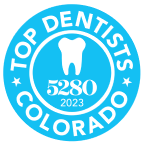 Drifting off to sleep can be hard when you have tomorrow’s to-do list running through your head. We’ve all been there, but for many people, it’s a nightly occurrence. When stress, worry, and anxiety from the day spill over into your sleep cycle, teeth grinding and clenching (or the clinical term, bruxism) can contribute to headache pain or even migraines.
Drifting off to sleep can be hard when you have tomorrow’s to-do list running through your head. We’ve all been there, but for many people, it’s a nightly occurrence. When stress, worry, and anxiety from the day spill over into your sleep cycle, teeth grinding and clenching (or the clinical term, bruxism) can contribute to headache pain or even migraines.
If you have symptoms of teeth grinding or clenching, and are looking for relief, our Denver, CO, practice can help. At Metropolitan Dental Care, we offer night guards and other dental appliances that protect the strength of your teeth, support a restful night’s sleep, and reduce secondhand symptoms of bruxism—like headaches, TMJ pain, tooth sensitivity and more—for a better quality of life. Contact our practice today to schedule an appointment!
A “Tense” Night’s Sleep
While some people also clench and grind teeth during the day, many patients suffer from unconscious, nighttime bruxism. When teeth grinding occurs while you are sleeping, it can be hard to determine whether you have bruxism. However, the following symptoms can alert you that you may be unconsciously grinding:
- Increased tooth pain
- Increased sensitivity
- Jaw pain or soreness
- Muscle stiffness or pain in the neck and shoulders
- Fatigue
- Tension headaches or migraines
- Earaches
Additionally, your dentist may detect signs of teeth grinding at your examination. Worn enamel or flattened teeth are a sign that your teeth are being put under pressure at night.
The Relationship Between Bruxism and Migraines
Dentists and other health professionals have seen a strong correlation between bruxism and head pain or migraines. The main reason? It starts with your temporomandibular joint, or TMJ. This joint acts as a type of hinge to allow your jaw free range of motion. However, the muscles that connect to your TMJ and allow you to chew or talk, can also be the source of pain, stiffness, or soreness in patients who suffer from night-time teeth grinding or clenching.
When you clench your teeth at night, the jaw muscles surrounding and supporting the TMJ tighten. This tightening, when occurring for long periods of time or for numerous nights in a row, can cause muscle pain and fatigue, which can transfer to other muscles in the neck and head. Tension headaches or migraines can be a result of this strain on your facial muscles.
Finding Relief
If you suffer from bruxism, there are steps you can take to find relief. For many people, dealing with their feelings of stress and anxiety help to reduce or even eliminate night-time grinding. By implementing lifestyle changes such as creating a regular fitness routine, eating a healthier diet, practicing meditation, or taking anti-anxiety medication, you may discover a decrease in your bruxism symptoms.
Our practice also offers custom-fitted night guards. These plastic oral appliances are easy to wear and prevent teeth-to-teeth contact in the night. This significantly reduces enamel erosion and can prevent undue strain on jaw and facial muscles that contribute to headaches from bruxism.
Contact Us for Teeth Grinding Treatment
If you are living with symptoms of bruxism, do not put off treatment; teeth grinding and clenching can cause lasting damage to teeth and cause unnecessary muscle pain and discomfort. Our Denver, CO dental team is experienced in treating patients with bruxism. Give us a call at 303.534.2626.

